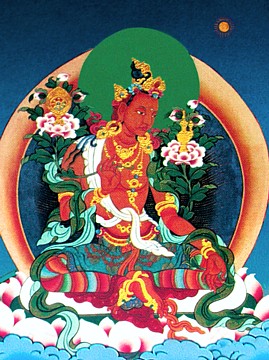The Ornament of the Mahayana Sutras: Difference between revisions
No edit summary |
No edit summary |
||
| Line 1: | Line 1: | ||
[[Image:Maitreya.jpg|frame|'''Maitreya''']]'''The Ornament of the Mahayana Sutras''' (Skt. ''Mahāyānasūtrālaṅkāra''; Tib. ཐེག་པ་ཆེན་པོའི་མདོ་སྡེའི་རྒྱན་, ''Tekpa Chenpö Do Dé Gyen''; [[Wyl.]] ''mdo sde’i rgyan''; Trad. Chin. 大乘莊嚴經論) — one of the [[Five Treatises of Maitreya]]. It is included among the so-called "[[Thirteen great texts]]", which form the core of the curriculum in most [[shedra]]s and on which [[Khenpo Shenga]] provided commentaries. | [[Image:Maitreya.jpg|frame|'''Maitreya''']]'''The Ornament of the Mahayana Sutras''' (Skt. ''Mahāyānasūtrālaṅkāra''; Tib. ཐེག་པ་ཆེན་པོའི་མདོ་སྡེའི་རྒྱན་, ''Tekpa Chenpö Do Dé Gyen''; [[Wyl.]] ''theg pa chen po'i mdo sde’i rgyan''; Trad. Chin. 大乘莊嚴經論) — one of the [[Five Treatises of Maitreya]]. It is included among the so-called "[[Thirteen great texts]]", which form the core of the curriculum in most [[shedra]]s and on which [[Khenpo Shenga]] provided commentaries. | ||
==Outline== | ==Outline== | ||
Revision as of 14:26, 30 December 2017

The Ornament of the Mahayana Sutras (Skt. Mahāyānasūtrālaṅkāra; Tib. ཐེག་པ་ཆེན་པོའི་མདོ་སྡེའི་རྒྱན་, Tekpa Chenpö Do Dé Gyen; Wyl. theg pa chen po'i mdo sde’i rgyan; Trad. Chin. 大乘莊嚴經論) — one of the Five Treatises of Maitreya. It is included among the so-called "Thirteen great texts", which form the core of the curriculum in most shedras and on which Khenpo Shenga provided commentaries.
Outline
The text has twenty-one chapters (Tib. ལེའུ, le’u):
| This section contains Tibetan script. Without proper Tibetan rendering support configured, you may see other symbols instead of Tibetan script. |
- Chapter One
- Establishing the Mahayana
- Refuge
- Gotra (Tib. རིགས་, rigs)
- Bodhicitta (Tib. སེམས་བསྐྱེད་, sems bskyed)
- Accomplishment/Practice (Tib. སྒྲུབ་པ་, sgrub pa)
- Suchness (Tib. དེ་ཁོ་ན་ཉིད་, de kho na nyid)
- Power (Tib. མཐུ་, mthu)
- Complete Maturation (Tib. ཡོངས་སུ་སྨིན་པ་, yongs su smin pa)
- Awakening (Tib. བྱང་ཆུབ་, byang chub)
- Aspiration (Tib. མོས་པ་, mos pa)
- Thorough Investigation Tib. ཡོངས་སུ་ཚོལ་བ་, yongs su tshol ba
- Explication (Tib. བཤད་པ་, bshad pa)
- Practice (Tib. སྒྲུབ་པ་, sgrub pa)
- Subsequent Teaching of the Instructions (Tib. གདམས་ངག་རྗེས་སུ་བསྟན་པ་, gdams ngag rjes su bstan pa)
- Tib. ཐབས་དང་ལྡན་པའི་ལས་, thabs dang ldan pa’i las
- The paramitas and means of attraction (Tib. བསྡུ་པ་, bsdu ba)
- Tib. མཆོད་པ་དང་བསྟེན་པ་དང་ཚད་མེད་པ་, mchod pa dang bsten pa dang tshad med pa
- The [thirty-seven] Harmonies with Enlightenment (Tib. བྱང་ཆུབ་ཀྱི་ཕྱོགས་དང་མཐུན་པ་, byang chub kyi phyogs dang mthun pa)
- Enlightened Qualities (Tib. ཡོན་ཏན་, yon tan)
- Tib. སྤྱོད་པ་དང་མཐར་ཐུག་པ་, spyod pa dang mthar thug pa
Quotations
རྣམ་པར་མི་རྟོག་ཡེ་ཤེས་ལྡན། །
འདོད་པ་ཐམས་ཅད་ཡོངས་རྫོགས་བྱེད། །
Generosity in which adverse factors have disappeared,
Endowed with wisdom that is non-conceptual,
Completely fulfills all wishes,
And brings all beings to maturity at the three levels.
- Maitreya, Ornament of Mahāyāna Sūtras, XVII, 8
ཡོན་ཏན་ལྷག་པ་བརྩོན་བཅས་ལུང་གིས་ཕྱུག །
དེ་ཉིད་རབ་ཏུ་རྟོགས་པ་སྨྲ་མཁས་ལྡན། །
One should follow a spiritual teacher who is disciplined, peaceful, serene,
Endowed with special qualities, diligent, rich in scriptural learning,
Highly realized concerning the nature of reality, skilled in speaking,
The embodiment of love, and indefatigable.
- Maitreya, Ornament of Mahāyāna Sūtras, XVII, 10
Tibetan Text
Translations
- S. Levi, Mahāyāna Sūtrālaṅkāra. Exposé de la doctrine du grand véhicule selon le système Yogācāra, Honoré Champion, Paris, 1911
- Asanga, Universal Vehicle Discourse Literature Mahayanasutralamkara (Treasury of the Buddhist Sciences), American Institute of Buddhist Studies, 2004
- Mahayana-Sutralankara (mdo sde’i rgyan), Maitreya – Asanga with commentary by Jamgön Mipham, Padmakara, forthcoming translation
- Maitreya. Ornament of the Great Vehicle Sutras: Maitreya’s Mahayanasutralamkara with Commentaries by Khenpo Shenga and Ju Mipham. Dharmachakra Translation Committee Shambhala Publications, 2014.
